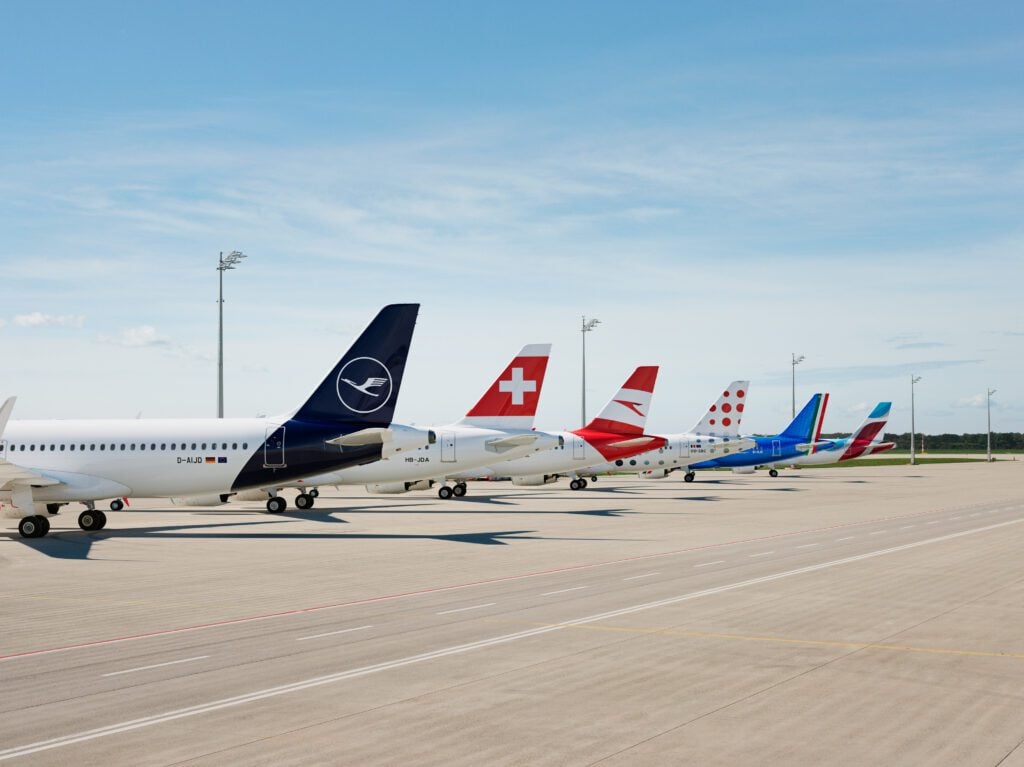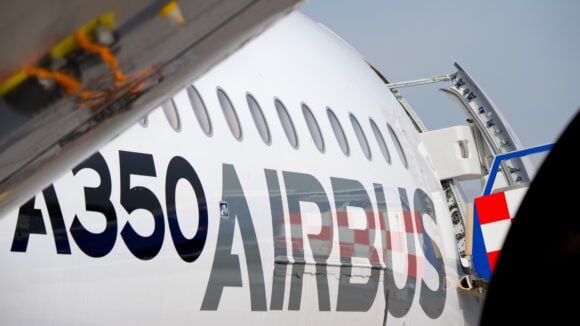
Lufthansa Group airlines aircraft parked
Lufthansa has continued to advocate for changes in European and German legislation that would, in its view, enable European airlines to compete more effectively against incumbents in other countries and states.
The German airline group’s monthly Policy Brief (Politikbrief) newsletter detailed that while airlines should welcome around 5 billion passengers in 2025, profit margins are still low (3.7%). “While direct competitors are expanding at the gates of the EU, European network airlines are experiencing structural competitive disadvantages,” it said.
Lufthansa pointed out that, for example, on flights from Germany to Asia, 37% passengers flew directly, while another 25% transferred in Europe. The remaining 38%, split evenly, were transferred in the Gulf, Turkey, or another country before reaching their final destination in 2010.
By 2024, that had fundamentally changed: 34% passengers now transfer in the Gulf or Turkey, with another 23% stopping elsewhere. 25% travelers are flying non-stops, and the remaining 17% fly with a transfer in Europe.
“Without an active aviation strategy, Germany and Europe are facing increasing pressure in global competition.”
According to the company, airlines from the Gulf region, such as Emirates or Qatar Airways, thrive in the European Union (EU) without having to adhere to the bloc’s regulations. Comparing the operating conditions for Germany, Qatar, and the United Arab Emirates (UAE), Lufthansa highlighted that while airlines have to pay aviation taxes in Germany, the same could not be said about Qatar and the UAE.
The same regulatory asymmetry between Germany and Qatar and the UAE is observed in fees (airport or air traffic control (ATC) charges), environmental and consumer protection (such as sustainable aviation fuel (SAF) quotas or EU261 regulation), and labor protections, including the fact that Germany has employment protections, and citizens can join unions and strike.
Though notably, Qatari law permits Qatari citizens to join unions and strike, yet the country’s working-age population in 2023 comprised 2.3 million non-Qatari citizens and around 229,000 Qatari citizens.
“European airlines operate in one of the most heavily regulated jurisdictions in the world. Constantly new environmental regulations, emissions trading, fragmented airspace, and strict passenger compensation rules are driving up costs for EU airlines ever higher.”
Lufthansa stated that regulatory expenses rose by 11% per year between 2014 and 2024, while passenger numbers increased by only 4% annually during the same period. This includes sustainability-related costs, with the German airline group pointing out that tackling climate change is “a global task.”
While SAF is still scarce and expensive, the current “EU climate policy weakens European airlines and hubs in international competition, as it unilaterally increases the cost of transfers in Europe,” resulting in traffic and emissions shifting to other jurisdictions, rather than being reduced.
For example, as part of the ‘Fit for 55’ package, which aims to reduce the EU’s 2030 emissions by 55% compared to 1990 levels, the ReFuelEU Aviation regulation has mandated a minimum SAF blend of 2% of SAF from January 1, 2025, growing to 5% from January 1, 2030.
As a result, because only departing flights from the EU have to adhere to the mandate, transfers in Frankfurt should be at least €180 ($210) more expensive at Frankfurt Airport (FRA) than at Istanbul Airport (IST) in 2035.
Lastly, Lufthansa pointed out the discrepancy between taxes in Germany and the rest of Europe. For example, an Airbus A320 flight with 150 passengers departing FRA to any EU destination is taxed (aviation tax, security fees, and ATC charges) €4,850 ($5,675). Departures from Rome Fiumicino Airport (FCO), where Lufthansa Group’s newest hub airline, ITA Airways, is based, are taxed €2,180 ($2,551).
Lufthansa’s Policy Brief newsletter has been primarily focused on these issues. The newsletter’s September edition said that aviation taxes are the highest in Europe, while in July, the group stated that “no other European country imposes a greater tax burden on flights than Germany.”
When it published its H1 2025 results on July 31, the opening statement of Carsten Sphor, the Chairman and Chief Executive Officer (CEO) of Lufthansa Group, read that the “disproportionate burden on European airlines due to unilateral EU regulations also continues to put us at a disadvantage in global competition.”
Views: 289



